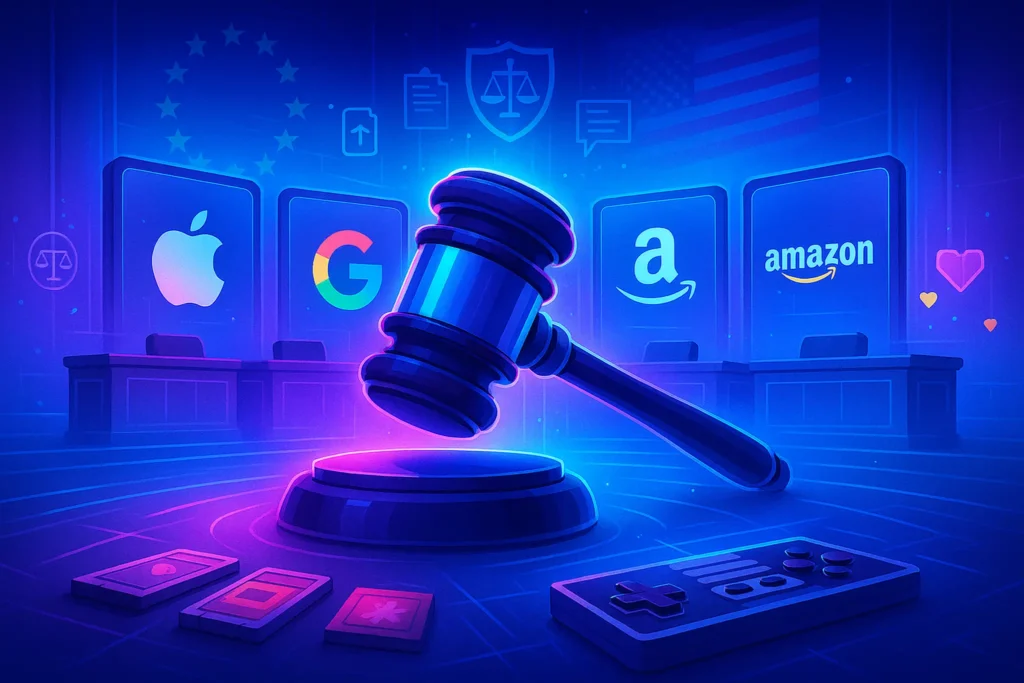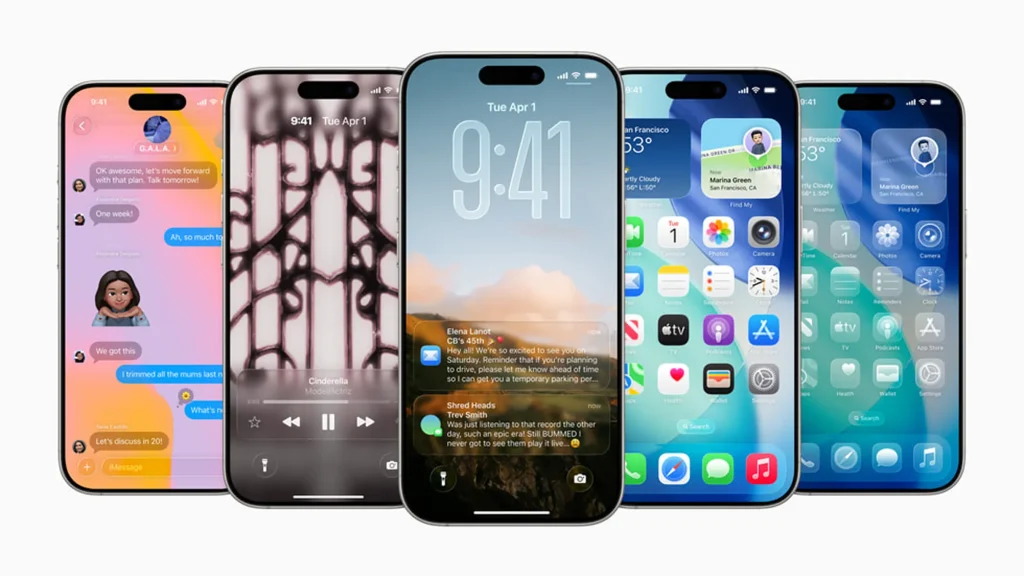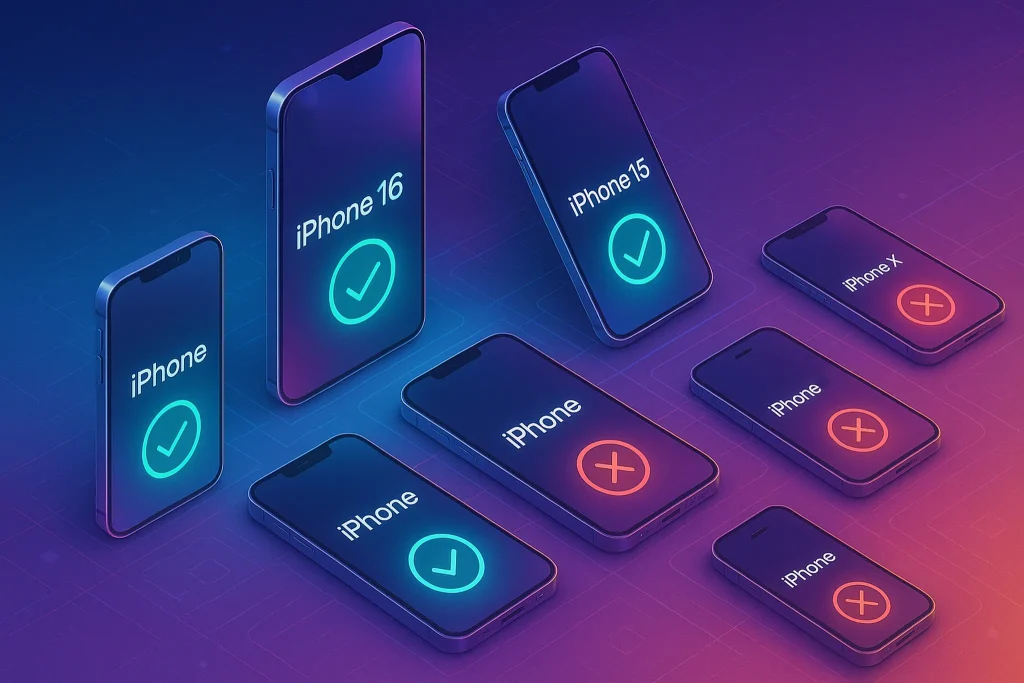-This post may contain affiliate links. If you click on one and make a purchase, I may earn a small commission at no extra cost to you.-
Introduction: Why Big Tech Is Under Fire—Again
For years, the world’s biggest tech companies have operated in a realm of unprecedented influence—controlling everything from how we search and shop, to where we download apps and how we advertise online. But that era of unchecked dominance may be cracking.
Governments across the globe are now aggressively challenging this power. From the U.S. Department of Justice’s antitrust case against Google, to the European Union forcing Apple to open its App Store, and the FTC suing Amazon for monopolistic practices—regulators are tightening the noose.
But what do these lawsuits really mean for the future of the digital ecosystem? Will they truly level the playing field, or are they just political posturing?
Let’s break down what’s happening, what’s at stake, and why you should care—whether you’re a consumer, marketer, or developer.
What’s Happening: A Quick Rundown of the Major Antitrust Battles
🔍 DOJ vs. Google (Search and Ad Tech)
The U.S. Department of Justice argues that Google has used illegal tactics to maintain its monopoly in search and advertising. It pays billions to be the default on browsers and devices, leaving little room for competition like DuckDuckGo or Bing. The case is seen as one of the most significant antitrust actions since Microsoft in the 1990s.
Implication: If the court rules against Google, it could limit the company’s ability to secure default placements—shaking the foundation of its search dominance.
🇪🇺 EU vs. Apple (App Store and Digital Markets Act)
The EU’s Digital Markets Act (DMA) has forced Apple to make fundamental changes, including allowing sideloading and third-party app stores. Apple has pushed back, citing privacy concerns, but the Commission argues that consumer choice and developer freedom must come first.
Notable Impact: Developers could soon bypass Apple’s 30% cut, a move that would empower small players and potentially lower app prices.
⚖️ FTC vs. Amazon (E-Commerce Domination)
The U.S. Federal Trade Commission has accused Amazon of abusing its monopoly power by favoring its own products in search results, manipulating pricing rules, and using seller data unfairly. If the lawsuit gains traction, Amazon’s entire marketplace model might face restructuring.
🔐 Meta’s Data & Acquisition Strategy Under Scrutiny
While Meta isn’t facing a singular mega-case, it’s constantly under fire for how it handles acquisitions (like Instagram and WhatsApp) and how it collects user data across its platforms. The concern: Meta stifles innovation by buying competitors early and then extracting behavioral data at massive scale.
Why Antitrust Matters in Tech
“The problem isn’t innovation—it’s domination.”
— Lina Khan, Chair of the FTC
Antitrust law isn’t just about economics—it’s about protecting innovation, ensuring fair competition, and maintaining user rights in a digital-first world.
When companies like Google dominate search, they control who gets seen online—making it extremely difficult for independent publishers and new platforms to gain visibility. (For a deeper look at how Google’s tech is evolving, see our Analysis of Google’s Gemini AI Update).
Similarly, Apple’s App Store restrictions mean developers face a walled garden—with high fees and limited freedom. Amazon’s self-preferencing undermines smaller sellers. Meta’s grip on social data makes it nearly impossible for new social platforms to emerge.
In short, when one player controls the rules, everyone else loses their voice.
How This Affects You (Even If You’re Not in Tech)
Antitrust cases may sound abstract, but their impact ripples into everyday life—especially in the digital age.
🔸 Consumers
-
Less Choice, Higher Prices: If app developers are forced to pay 30% to Apple, that cost often gets passed to users.
-
Limited Access: Without sideloading, iOS users can only install what Apple allows.
-
Privacy Tradeoffs: Dominant players dictate what data gets collected and how it’s used.
Think about it: if Google controls most search results, are you really seeing the best answers—or just the ones they profit from most?
🔸 Freelancers, Marketers & Publishers
-
SEO Inequity: Competing with Google-owned content (like YouTube or Google News) is increasingly difficult.
-
Advertising Monopoly: Google and Meta dominate ad distribution, leaving smaller advertisers with limited options and rising CPCs.
-
Data Lock-In: As platforms tighten their data sharing, marketers lose valuable targeting insights.
Cybersecurity in 2025 — why platform consolidation poses risks to data privacy.
🔸 Developers
-
Platform Dependence: Apple’s App Store rules mean developers can’t experiment with alternative pricing or app models.
-
Revenue Cuts: The infamous 30% “Apple Tax” can decimate indie app profitability.
-
API Access: Gatekeeping limits innovation and raises the barrier to entry for newcomers.
Global Impact: A Worldwide Crackdown
The regulatory wave isn’t limited to the U.S. Here’s how the rest of the world is responding:
🇪🇺 Europe
-
DMA (Digital Markets Act): Targets gatekeeper platforms like Apple and Google.
-
DSA (Digital Services Act): Adds transparency and accountability rules.
🇮🇳 India
-
Android Ecosystem Scrutiny: The Competition Commission of India fined Google for abusing its dominance in mobile OS and app bundling.
🇨🇳 China
-
While often politically motivated, China has also cracked down on its own tech giants like Alibaba and Tencent—largely to regain control over economic and social influence.
🇺🇸 U.S.
-
With the FTC and DOJ more aggressive under recent leadership, Big Tech’s legal future in America remains turbulent but unavoidable.
🧩 Then vs. Now: Why This Antitrust Era Is Different
When people hear “antitrust,” they often think of the iconic Microsoft vs. DOJ case from the late 1990s. That lawsuit, which accused Microsoft of bundling Internet Explorer with Windows, was seen as a major victory for market fairness. But today’s antitrust challenges are fundamentally more complex.
⚖️ Then (Microsoft Era):
-
Focus: Desktop software (OS + browser)
-
Monopoly Argument: Clear product bundling and user lock-in
-
Market Impact: Traditional business models, less consumer data involved
🌐 Now (Big Tech Era):
-
Focus: Platforms, data, and ecosystems (search, ads, apps, social)
-
Monopoly Argument: Less obvious—revolves around control of access, visibility, and algorithmic power
-
Market Impact: Affects every digital actor—users, creators, developers, advertisers
For instance, while Microsoft bundled software, Google curates your online world through ranking algorithms. Apple’s App Store isn’t just a store—it’s a gatekeeper to over a billion users. Meta doesn’t just offer a product—it shapes social interaction.
The battlefield has moved from installation to algorithmic influence, from CD-ROMs to cloud-based monopolies.
🎭 The Critics Speak: Is Antitrust Going Too Far?
Not everyone agrees with the wave of lawsuits and regulations. Some economists and industry insiders warn that overregulation could stifle innovation rather than encourage it.
Common Counterarguments:
-
🧩 Big Tech earns dominance through value
“If Apple makes the best hardware and Google the best search, why penalize them?” -
📉 Breaking up companies could harm integration
Ecosystems like Google Ads + Analytics or iPhone + App Store + iCloud offer streamlined UX. Fragmenting them might lead to user frustration or security gaps. -
🚫 Innovation may slow
If companies are hesitant to invest in bold R&D for fear of antitrust backlash, progress may stall.
However, defenders of regulation argue that unchecked consolidation is a long-term innovation killer—as it makes it nearly impossible for new players to compete. True innovation flourishes when new ideas can thrive, not just when old ones dominate.
What’s Next? Possible Future Scenarios
Here’s what might unfold over the next few years as legal and policy battles play out:
🗓️ Visual Timeline
| Timeframe | Possibility |
|---|---|
| 2025 | Google adjusts default search deals |
| 2026 | Apple enables full sideloading in iOS |
| 2027 | App Store fee structure reformed |
| 2028 | FTC forces Amazon to unbundle marketplace |
| Beyond | Meta faces forced divestitures (e.g. Instagram) |
🧠 Nerd Verdict
Antitrust isn’t about breaking companies just for the sake of it. It’s about breaking bad behavior.
The dominance of Big Tech has created an ecosystem where gatekeepers profit the most, while everyone else—from creators to consumers—plays by their rules.
Will these companies be split up like Standard Oil? Maybe not. But even forced transparency, open APIs, and more platform flexibility can drastically shift the power dynamics.
At stake is more than money—it’s the very fabric of the internet, and the future of innovation.
❓ FAQ: Nerds Ask, We Answer
💬 Would You Bite?
If Google Ads were banned tomorrow and iOS allowed full sideloading, what would change for your business or digital habits?
Are you for or against breaking up Big Tech?
Drop your thoughts below 👇



